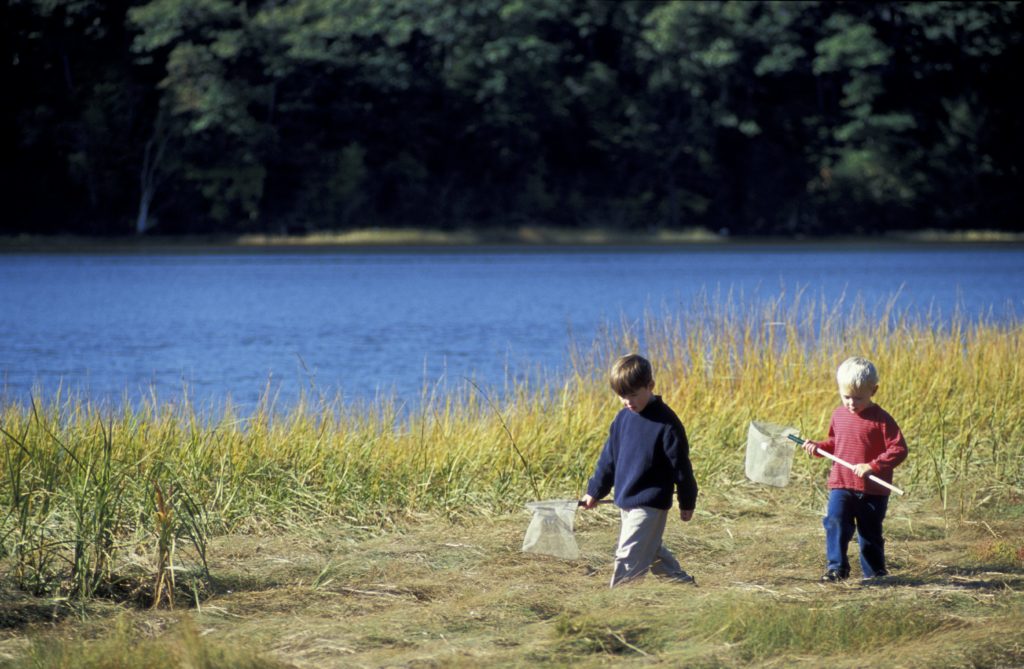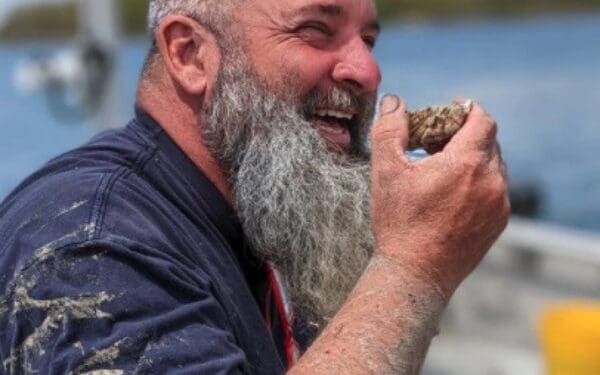
CLF works to protect the things we all love about these long, summer days in Maine, including the Royal River in Yarmouth. Photo: EcoPhotography
It’s finally summer in Maine – and that means lots of opportunities to get outside and enjoy everything from whale watching, to fishing, to visiting our local farmers’ markets. CLF works every day to protect the things we all love about these long, hot days in Vacationland – not only because of the opportunities for recreation and renewal our natural resources provide, but also the critical role they play as drivers of our economy and livelihoods.
Protecting the Gulf of Maine’s Whales
One of Maine’s most popular ocean activities is whale watching, which depends on the presence of – you guessed it – whales in the Gulf of Maine. With a bit of luck, boaters will catch breathtaking glimpses of the species that are the pinnacle of any trip to our ocean: humpback whales, fin whales, Minke whales, and even the iconic North Atlantic right whale.
But many species of whales are in trouble. Most concerning is the North Atlantic right whale, which could be extinct within 25 years if we don’t act now to save them. Fewer than 450 remain on the planet, and human activities are the leading causes of death: 85 percent of right whale deaths in recent years were caused by entanglement in fishing gear.
CLF has been fighting for right whales for decades, and we’ve recently stepped up our efforts. We cannot sit idly by while this species is tangled, dragged, drowned, and starved to death by ropes clogging the waters that are their home. That’s why earlier this year, we sued the federal government to enforce the Endangered Species Act and the Marine Mammal Protection Act.
While CLF believes that these magnificent animals are worth saving for their own right, they are also invaluable to New England. North Atlantic right whales played a huge part in the region’s history, are important to our culture, and help maintain healthy ocean ecosystems. And, yes, they support our tourism economy, too.
We’ll continue fighting as long as it takes to ensure that measures are taken to protect these fascinating creatures from extinction.
Restoring the Royal River
The Royal River in Yarmouth, Maine, runs through the center of town, including popular Royal River Park, and serves as a boating and swimming haven for the local community and its many visitors. Birders meander riverside footpaths and paddle by in kayaks and canoes, seeking a glimpse of the many raptors, shorebirds, ducks, and songbirds that call the Royal home.
For those who love to fish, the upstream freshwater rapids hold the promise of brown trout and brookies, while the estuarine lower river is home to summer-long runs of striped bass. The Royal is also one of the rare places where one can land the mythical sea-run brown trout that migrate back and forth between their salt- and freshwater homes.
CLF’s advocacy has helped sustain this vibrant ecological hub through our efforts to protect the baitfish populations that are the main food source for many species in the river; our work to safeguard its saltwater marshes and shoreline habitat with Restore America’s Estuaries; and our ongoing advocacy to restore upstream passage for fish on the river.
And our work to protect the Royal continues. Two dams on the river currently prevent river herring and other fish from swimming upstream to spawn. This has pushed the river herring population dangerously close to collapse. As a keystone species, river herring provide food for birds and fish, as well as bait for sport, lobster, and commercial fishing – making it crucial for us to restore their population to healthy levels.
In May, we took legal action to restore access for fish in the Royal River. We hope our advocacy will help prompt action to re-open the Royal to these native species, providing food for its fish, birds, and its many other inhabitants and further enhancing this great resource.
Helping Maine Farmers Thrive
Summer in Maine means that farmers markets are in full swing. It’s the season for fresh fruits, vegetables, cheeses, meats, jams, and other delicious foods grown and prepared by local farmers and food entrepreneurs. CLF’s Legal Food Hub helps out these farm and food businesses when they need legal help by matching them with volunteer attorneys who provide that assistance for free.
In the first two years of the program, we have placed more than 130 cases in Maine alone. Among them is Two Fox Farm, a vegetable farm in Brooks, Maine. Two Fox Farm works with the Ellsworth Farmers Market, runs a small community-supported agriculture (CSA) program, and sells wholesale to restaurants and the Marsh River Co-Op. The farm’s owners are receiving legal assistance from attorneys Durward Parkinson and Ben McCall of Bergen Parkinson on forming a limited-liability company (LLC), which will help protect the farm’s name and the farm owners’ personal assets.
Our program has also served the Maine Federation of Farmers’ Markets, a grassroots organization that supports farmers markets across Maine. The federation received legal assistance from attorney Kenleigh Nicoletta of the firm Brann & Isaacson on applying for status as a nonprofit 501(c)(3) organization, which will help protect the organization from personal liability and make it eligible for certain tax exemptions. The Federation also received help from attorney Dave McConnell of the firm Perkins Thompson on navigating legal issues concerning its organizational branding, which will help protect the organization’s brand and reputation.
Standing Up for Maine, All Year Long
Summertime in Maine is a wonderful experience, thanks in large part to the incredible nature our state is home to. All year long, CLF is working to protect the things we love most about Maine, from the depths of the ocean to the top of Mt. Katahdin.



